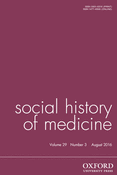-
Views
-
Cite
Cite
Erin J. Lux, Robert Peckham (ed.), Disease and Crime: A History of Social Pathologies and the New Politics of Health, Social History of Medicine, Volume 29, Issue 3, August 2016, Pages 657–659, https://doi.org/10.1093/shm/hkw030
Close - Share Icon Share
Extract
Disease and Crime: A History of Social Pathologies and the New Politics of Health , part of a Routledge series on Cultural History, examines from many different angles the complex relationships between ideas about disease and crime. In his introduction, editor Robert Peckham states that the aim of this book is to map ‘the tensions, overlaps, and contradictions within and between social and biological understandings of disease and crime, tracking the discursive formation of the “diseased” criminal from the mid-nineteenth century to the rise of bio criminology and the new biology of deviance and control in the twenty-first century’ (p. 1).
The volume is very well structured. The introduction does an excellent job of synthesising the themes of global connectedness, space and ‘contagion’—both biological and social—that arise throughout the book; there are two sections, each with four chapters. The first section focuses on nineteenth-century ideas about crime and disease, and their twentieth-century consequences. The second section examines the late twentieth and early twenty-first century from the perspective of very different ideas about disease and crime. All of the chapters pick up similar themes and examine them from a multitude of angles, creating a cohesive whole that is at the same time cross-cultural and represents a diversity of historical periods and methodologies.




